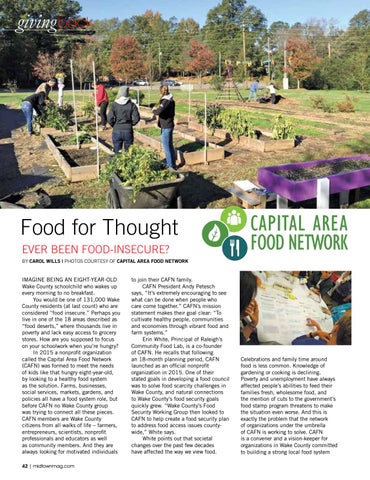giving back
Food for Thought EVER BEEN FOOD-INSECURE? BY CAROL WILLS | PHOTOS COURTESY OF CAPITAL AREA FOOD NETWORK
IMAGINE BEING AN EIGHT-YEAR-OLD Wake County schoolchild who wakes up every morning to no breakfast. You would be one of 131,000 Wake County residents (at last count) who are considered “food insecure.” Perhaps you live in one of the 18 areas described as “food deserts,” where thousands live in poverty and lack easy access to grocery stores. How are you supposed to focus on your schoolwork when you’re hungry? In 2015 a nonprofit organization called the Capital Area Food Network (CAFN) was formed to meet the needs of kids like that hungry eight-year-old, by looking to a healthy food system as the solution. Farms, businesses, social services, markets, gardens, and policies all have a food system role, but before CAFN no Wake County group was trying to connect all these pieces. CAFN members are Wake County citizens from all walks of life – farmers, entrepreneurs, scientists, nonprofit professionals and educators as well as community members. And they are always looking for motivated individuals 42 | midtownmag.com
to join their CAFN family. CAFN President Andy Petesch says, “It’s extremely encouraging to see what can be done when people who care come together.” CAFN’s mission statement makes their goal clear: “To cultivate healthy people, communities and economies through vibrant food and farm systems.” Erin White, Principal of Raleigh’s Community Food Lab, is a co-founder of CAFN. He recalls that following an 18-month planning period, CAFN launched as an official nonprofit organization in 2015. One of their stated goals in developing a food council was to solve food scarcity challenges in Wake County, and natural connections to Wake County’s food security goals quickly grew. “Wake County’s Food Security Working Group then looked to CAFN to help create a food security plan to address food access issues countywide,” White says. White points out that societal changes over the past few decades have affected the way we view food.
Celebrations and family time around food is less common. Knowledge of gardening or cooking is declining. Poverty and unemployment have always affected people’s abilities to feed their families fresh, wholesome food, and the mention of cuts to the government’s food stamp program threatens to make the situation even worse. And this is exactly the problem that the network of organizations under the umbrella of CAFN is working to solve. CAFN is a convener and a vision-keeper for organizations in Wake County committed to building a strong local food system
